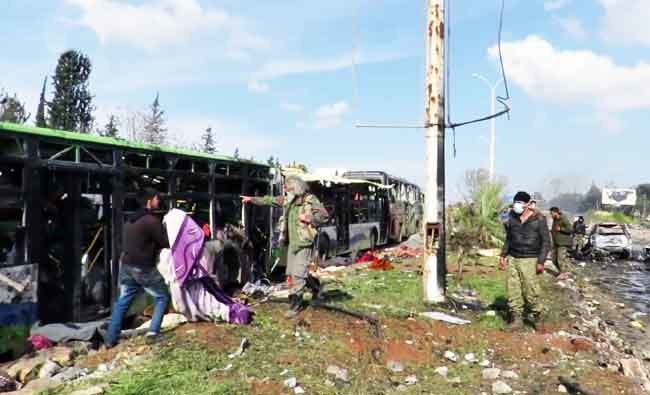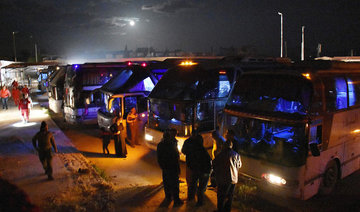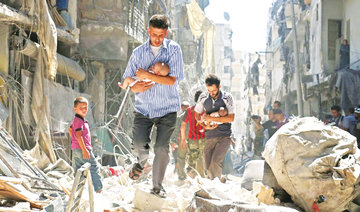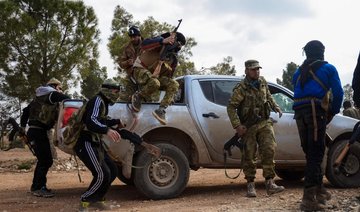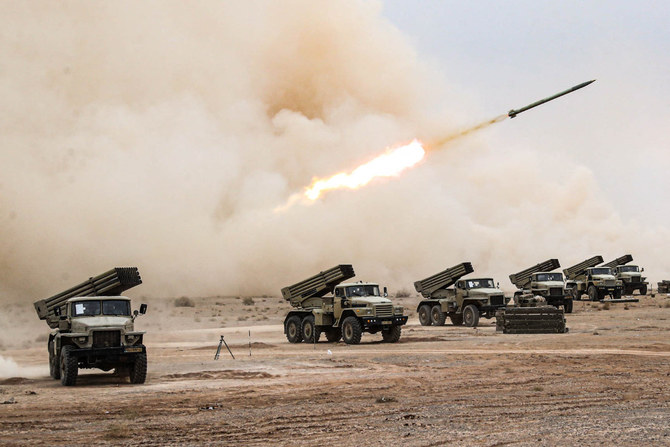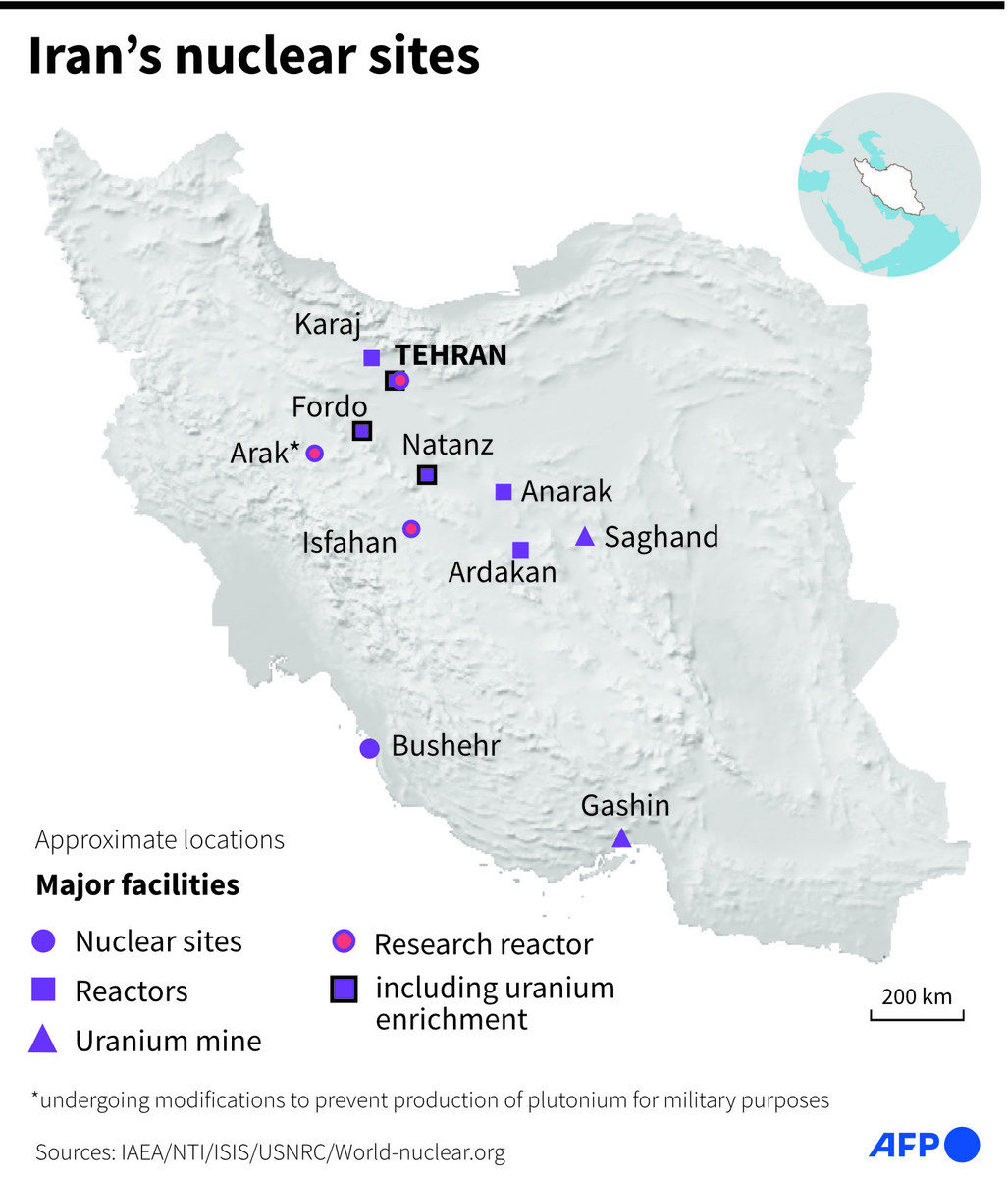BEIRUT: A stalled population transfer resumed Saturday after a deadly explosion killed at least 100, including children, government supporters and opposition fighters, at an evacuation point — adding new urgency to the widely criticized operation.
The blast ripped through a bus depot in the Al-Rashideen area where thousands of government loyalists evacuated the day before waited restlessly for hours, as opposition fighters guarded the area while negotiators bickered over the completion of the transfer deal. Only meters away, hundreds of evacuees from pro-rebels areas also loitered in a walled-off parking lot, guarded by government troops.
Footage from the scene showed bodies, including those of fighters, lying alongside buses, some of which were charred and others gutted from the blast. Personal belongings could be seen dangling out of the windows. Fires raged from a number of vehicles as rescuers struggled to put them out.
The scenes were the last in the unyielding bloodshed Syrians are living through. Earlier this month, at least 89 people were killed in a chemical attack as children foaming at the mouth and adults gasping for last breath were also caught on camera.
The bloody mayhem that followed the Saturday attack only deepened the resentment of the transfer criticized as population engineering. It also reflected the chaos surrounding negotiations between the warring parties. The United Nations did not oversee the transfer deal of the villages of Foua and Kfraya, besieged by the rebels, and Madaya and Zabadani, encircled by the government.
No one claimed responsibility for the attack but pro-government media and the opposition exchanged accusations, each pointing to foreign interference or conspiracies undermining the deal.
State TV Al-Ikhbariya said the attack was the result of a car bomb carrying food aid to be delivered to the evacuees in the rebel-held area — ostensibly crisps for the children — and accused rebel groups of carrying it out. A TV broadcaster from the area said: “There can be no life with the terrorist groups.”
“I know nothing of my family. I can’t find them,” said a woman who appeared on Al-Ikhbariya, weeping outside the state hospital in Aleppo where the wounded were transported.
Ahrar Al-Sham, the rebel group that negotiated the deal, denounced the “cowardly” attack, saying a number of opposition fighters as well as government supporters were killed in the attack. The group said the attack only serves to deflect the attention from government “crimes” and said it was ready to cooperate with an international probe to determine who did it.
Yasser Abdelatif, a media official for Ahrar Al-Sham, said about 30 rebel gunmen were killed in the blast. He accused the government or extremist rebel groups of orchestrating the attack to discredit the opposition.
The Syrian Civil Defense in Aleppo province, also known as the White Helmets, said their volunteers pulled at least 100 bodies from the site of the explosion. White Helmets member Ibrahim Alhaj said the 100 fatalities documented by the rescuers included many children and women, as well as fighters.
Syrian state media said at least 39 were killed, including children. The opposition Syrian Observatory for Human Rights put the death toll at 43, adding that it would likely rise because of the extensive damage. A Facebook page belonging to the pro-government Foua and Kfraya villages said all those in three buses were killed or are still missing while a rebel official said at least 30 opposition fighters who were guarding the evacuees were killed in the blast.
According to Abdul Hakim Baghdadi, an interlocutor who helped the government negotiate the evacuations, 140 were killed in the attack. He added it was not clear how many rebels were killed because they were evacuated to their areas.
Hours after the explosion, the transfer resumed — as dozens of buses, starting with the wounded, left to their respective destinations. Before midnight Saturday, 100 of some 120 buses from both sides had already arrived.
The explosion hit the Al-Rashideen area, a rebel-controlled district outside Aleppo city where evacuation buses carrying nearly 5,000 people from the northern rebel-besieged villages of Foua and Kfraya were stuck. Residents from the two villages had been evacuated Friday, along with more than 2,000 from Madaya, an opposition-held town outside of Damascus besieged by government forces.
UN Secretary-General Antonio Guterres condemned the attack Saturday in a statement from his spokesman Stephane Dujarric, and called on all parties “to ensure the safety and security of those waiting to be evacuated.”
“Those responsible for today’s attack must be brought to justice,” the statement added.
The coordinated evacuations delivered war-weary fighters and residents from two years of siege and hunger, but moved Syria closer to a division of its national population by loyalty and sect.
Madaya and Zabadani, once summer resorts to Damascus, have been shattered under the cruelty of a government siege. The two towns rebelled against Damascus’ authority in 2011 when demonstrations swept through the country demanding the end of President Bashar Assad’s rule.
Residents were reduced to hunting rodents and eating tree leaves. Photos of children gaunt with hunger shocked the world and gave new urgency to UN relief operations in Syria.
Foua and Kfraya, besieged by the rebels, lived under a steady hail of rockets and mortars. They were supplied with food and medical supplies through military airdrops.
Critics say the string of evacuations, which could see some 30,000 people moved across battle lines over the next 60 days, amounts to forced displacement along political and sectarian lines.
The explosion came as frustration was already mounting over the stalling evacuation process.
“The situation is disastrous,” said Ahmed Afandar, a resident evacuated from the opposition area near Madaya. “All these thousands of people are stuck in less than half a kilometer (500 yards).” He said the area was walled off from all sides and there were no restrooms.
Afandar said people were not allowed to leave the buses for a while before they were let out. Food was distributed after several hours and by early afternoon the evacuees from rebel-held areas were “pressured” to sit back on their buses, Afandar said.
The evacuees from Madaya headed to rebel-held Idlib, west of Aleppo. After the blast, evacuees from opposition areas pleaded for protection fearing revenge attacks.
Syrian state TV blamed the rebels for obstructing the deal.
An opposition representative, Ali Diab, accused the government side of violating the terms of the agreement, by evacuating fewer armed men than agreed to from the pro-government areas.


